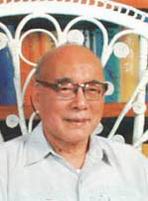Views
m |
m |
||
| Line 40: | Line 40: | ||
==Notable Students== | ==Notable Students== | ||
| + | * Qí Zhìjūn [[齊志軍]] | ||
| + | * Dázhào [[達照]] | ||
==Notes== | ==Notes== | ||
Current revision as of 00:41, 15 January 2011
Lǐ Yuányīn 李元音 (1905-2000)
|
| Notable Associates: |
|
Lǐ Yuányīn 李元音 (1905-2000) was the third patriarch of the Seal-Mind School 印心宗, after Wáng Xiāngliù 王驤陸[1], second patriarch, and Dàyú 大愚, the school's founder and first patriarch.
Contents |
Biography
In 1917, Lǐ moved with his father to Zhènjiāng 鎮江. Lǐ had studied the writings of Confucius and Mencius in his youth, but Buddhist texts proved impenetrable to him until he moved there. In Zhènjiāng, he went with his classmates to various Buddhist temples to learn about Buddhism. In particular, they went to see the Living Buddha of Jīnshān 金山活佛 at Jiāngtiān Temple 江天寺 on Jīnshān 金山.
In 1923, Lǐ moved with his father again, this time to Shànghǎi 上海, where he tested into Hùjiāng University 滬江大學. In 1926, his father died. Lǐ tested into a job with the Postal Bureau, and used his wages to support his mother. He continued to study the Buddhist scriptures he had inherited from his father, and were it not for his mother, he would have ordained as a monk. He studied Tiāntái 天台 under Xīngcí 興慈, Consciousness-Only under Fàn Gǔ'nóng 范古農, and Huáyán 華嚴 and Chán 禪 under Yīngcí 應慈.
After the end of the Second Sino-Japanese War in 1945, Lǐ heard Wáng Xiāngliù lecture on the Platform Sūtra of the Sixth Patriarch 六祖壇經. After this, Lǐ went to Wáng's Seal-Mind Hermitage 印密精舍, where he took refuge under Wáng and studied Esoteric Buddhism with him.
In 1958, Lǐ received abhiṣeka 灌頂 from Wáng. Lǐ then lectured at temples and other sites on the Lotus 法華經, Diamond 金剛經, Huáyán 華嚴經, and other sūtras.
After the end of the Cultural Revolution in 1976, he restarted his religious activities throughout China. He had disciples in numerous foreign countries, including the United States, Canada, Germany, France, and Japan.
From 1995 to 1998, Lǐ lived and taught in New York City. He died in China in 2000.
Important Works
- 碧岩錄講座
- 禪海微瀾
- 略論明心見性
- 往生西方的關鍵問題
- 悟心銘淺釋
- 心經抉隱
Notable Students
Notes
- ↑ On the pronunciation of Wáng's name, see the entry on him.
References
- Yú Língbō 于凌波, ed. Xiàndài Fójiào rénwù cídiǎn 現代佛教人物辭典 (A Dictionary of Modern Buddhist Persons), 2 vols. Taipei: Foguang, 2004. Pp. 1.491a-492b.
- 印心精舍
